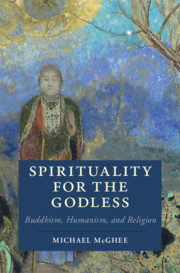Book contents
- Spirituality for the Godless
- Cambridge Studies in Religion, Philosophy, and Society
- Spirituality for the Godless
- Copyright page
- Dedication
- Epigraph
- Contents
- Acknowledgements
- A Shakespearean Prologue
- Introduction
- 1 ‘A Spiritually Enlightened Individual’
- 2 ‘The Resources of a Much Earlier Phase of the Tradition’
- 3 The Distractions of Baruch Spinoza
- 4 Immanuel Kant: ‘To Regard as Petty What We Are Otherwise Anxious About’
- 5 Wittgenstein’s Cool Temple
- 6 Rilke, Shakespeare … and a Little Freud
- 7 Concealment and Revelation
- 8 Mindfulness and the Form of a Philosophical Life
- 9 Epictetus: ‘The Beginning of Philosophy …’
- 10 Ted Hughes: Evaporation, Translation, Translocation
- 11 Philosophy as an Inventive Convergence of Methods
- 12 Richard Norman: ‘The Truths It Contains Are Human Truths’
- 13 Perspectives: Marmalade Stains on the Breakfast Table
- 14 David Hume: Wanting the Natural Sentiments of Humanity
- 15 ‘What is the Difference between Love and God’s Love?’
- 16 ‘Peace, Wild Wooddove, Shy Wings Shut’
- 17 ‘Only a Little Snivelling Half-Wit Can Maintain That’
- 18 ‘The World Is Too Much with Us’
- 19 Of Self and SELF, of Ātman and Anātman
- 20 ‘I Am Myself Alone’
- 21 The Five Heaps or Skandhas
- 22 ‘We Claim That There Is a Person, but We Do Not Say That He Is an Entity’
- 23 Birds, Frogs, and Tintern Abbey
- 24 Human Resources and Hubris
- References
- Index
7 - Concealment and Revelation
Published online by Cambridge University Press: 18 June 2021
- Spirituality for the Godless
- Cambridge Studies in Religion, Philosophy, and Society
- Spirituality for the Godless
- Copyright page
- Dedication
- Epigraph
- Contents
- Acknowledgements
- A Shakespearean Prologue
- Introduction
- 1 ‘A Spiritually Enlightened Individual’
- 2 ‘The Resources of a Much Earlier Phase of the Tradition’
- 3 The Distractions of Baruch Spinoza
- 4 Immanuel Kant: ‘To Regard as Petty What We Are Otherwise Anxious About’
- 5 Wittgenstein’s Cool Temple
- 6 Rilke, Shakespeare … and a Little Freud
- 7 Concealment and Revelation
- 8 Mindfulness and the Form of a Philosophical Life
- 9 Epictetus: ‘The Beginning of Philosophy …’
- 10 Ted Hughes: Evaporation, Translation, Translocation
- 11 Philosophy as an Inventive Convergence of Methods
- 12 Richard Norman: ‘The Truths It Contains Are Human Truths’
- 13 Perspectives: Marmalade Stains on the Breakfast Table
- 14 David Hume: Wanting the Natural Sentiments of Humanity
- 15 ‘What is the Difference between Love and God’s Love?’
- 16 ‘Peace, Wild Wooddove, Shy Wings Shut’
- 17 ‘Only a Little Snivelling Half-Wit Can Maintain That’
- 18 ‘The World Is Too Much with Us’
- 19 Of Self and SELF, of Ātman and Anātman
- 20 ‘I Am Myself Alone’
- 21 The Five Heaps or Skandhas
- 22 ‘We Claim That There Is a Person, but We Do Not Say That He Is an Entity’
- 23 Birds, Frogs, and Tintern Abbey
- 24 Human Resources and Hubris
- References
- Index
Summary
The Buddhist aspects of these issues have been relatively submerged, although I have focussed on the crucial question of the relation between ‘knowledge and vision of things as they are’, on the one hand, and the obstacles to that possibility in the form of the ‘three poisons’, on the other. I have referred to the significance of energy and its diversion into various forms of distraction, and discussed the conditions for the possibility of listening and hearing, as well as das Offene and ‘freedom’. Perhaps not unexpectedly, some of these themes emerge in the work of Martin Heidegger, in particular in his writing about what he calls ‘the essence of technology’ (1977), marred though it is by his anti-Semitic diary entries.
- Type
- Chapter
- Information
- Spirituality for the GodlessBuddhism, Humanism, and Religion, pp. 50 - 53Publisher: Cambridge University PressPrint publication year: 2021

